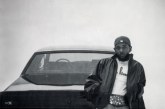Band gets heavier with John Corabi replacing Vince Neil on vocals
Perhaps no band embodied the decadent heavy-metal scene of the 1980s better than Mötley Crüe. Riding high through that decade, the group peaked with the release of 1990’s “Dr. Feelgood,” its top-selling and critically acclaimed smash-hit album.
But the band would not hit music store shelves again until 1994 – after it had sacked lead vocalist Vince Neil. Following Neil’s departure in 1992, the Crüe, which had just signed a lucrative $25 million contract with Elektra Records, recruited the services of vocalist/guitarist John Corabi, a veteran musician from The Scream.
On that self-titled LP, Mötley traded its traditional hair-band sound for a heavier and grungier sound, which had been popularized in the Pacific Northwest by bands like Pearl Jam, Soundgarden and Nirvana.
While the sound was (and still remains to many a listener) fresh, many of the group’s die-hard fans rejected the album because its new style was such a dramatic departure from what they had come to know and love. Furthermore, the band, which often had been shunned by those in the mainstream press due to its carefree and sometimes misogynistic attitude and lyricism, didn’t really win over critics with this release, either, although it received generally mixed reviews.
In my mind, however, this one of the most underrated and underappreciated works to ever be recorded.
While Mötley Crüe’s early work often was dismissed for its shallowness, here they go deeper and darker, experimenting with new sounds and instrumentation along the way. Corabi’s inclusion adds an extra guitar crunch to the mix that complements his vocals, which are powerful and soulful. His songwriting contributions are a welcome addition, as well.
“Mötley Crüe” opens with the promo single “Power to the Music,” which explores the dark side of Hollywood excess, drug use/addiction and suicide. Many of the tracks don’t deal with pleasant subjects, in fact, but the content is far from morbid or hopeless. The well-produced record spawned four other singles (“Smoke in the Sky,” “Uncle Jack,” “Misunderstood” and “Hooligan’s Holiday,” which appears on some of the band’s later greatest-hits compilations), but it proved to be a commercial failure.
Befuddled fans debated whether this version of the group featuring Nick Mars, Tommy Lee and Nikki Sixx were actually still Mötley Crüe. Some critics even went as far as to wonder whether the band should’ve put the music out under another name. They didn’t, obviously, and the album suffered due to the myopia of fans who failed to embrace the changes that Corabi brought with him.
And that’s too bad because “Mötley Crüe” never will get the respect it deserves in the world of rock ‘n’ roll. The album never struggles to establish an identity for itself, as it refreshingly makes no bones about its dark grunginess throughout. Neil, dare I say, is not missed here in a band that was in the midst of turning a page. Corabi, who remained with the band until Neil’s return in 1997, gave a group largely not taken seriously by people other than headbangers some serious musical credibility.








